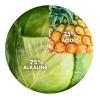CYBERMED LIFE - ORGANIC & NATURAL LIVING
CYBERMED LIFE - ORGANIC & NATURAL LIVING
 Less Acid-More Alkaline: Alkaline diet (also known as the alkaline ash diet, alkaline acid diet, acid ash diet, and acid alkaline diet) describes a group of loosely related diets based on the misconception that different types of food can have an effect on the pH balance of the body. It originated from theories related to osteoporosis research, however, most proponents of the diet maintain the incorrect belief that certain foods can affect the acidity (pH) of the body and can therefore be used to treat or prevent disease. Due to the lack of credible evidence supporting the claimed mechanism of this diet, it is not recommended by dietitians or other health professionals, though some have noted that eating unprocessed foods as this diet recommends may have incidental health benefits unrelated to bodily pH.
Less Acid-More Alkaline: Alkaline diet (also known as the alkaline ash diet, alkaline acid diet, acid ash diet, and acid alkaline diet) describes a group of loosely related diets based on the misconception that different types of food can have an effect on the pH balance of the body. It originated from theories related to osteoporosis research, however, most proponents of the diet maintain the incorrect belief that certain foods can affect the acidity (pH) of the body and can therefore be used to treat or prevent disease. Due to the lack of credible evidence supporting the claimed mechanism of this diet, it is not recommended by dietitians or other health professionals, though some have noted that eating unprocessed foods as this diet recommends may have incidental health benefits unrelated to bodily pH.
These diets have been promoted by alternative medicine practitioners, with the proposal that such diets treat or prevent cancer, heart disease, and low energy levels as well as other illnesses. Human blood is regulated at pH 7.35 to 7.45. Levels above 7.45 are referred to as alkalosis and levels below 7.35 as acidosis. Both are potentially serious, and the body has acid–base homeostasis mechanisms that generally ensure this does not happen. The idea that these diets can materially affect blood pH for the purpose of treating a range of diseases is not supported by scientific research and makes incorrect assumptions about how alkaline diets function that are contrary to human physiology.
Diets avoiding meat, poultry, cheese, and grains can be used in order to make the urine more alkaline (higher pH). However, difficulties in effectively predicting the effects of this diet have led to medications, rather than diet modification, as the preferred method of changing urine pH. The "acid-ash" hypothesis was once considered a risk factor for osteoporosis, though the current weight of scientific evidence does not support this hypothesis.